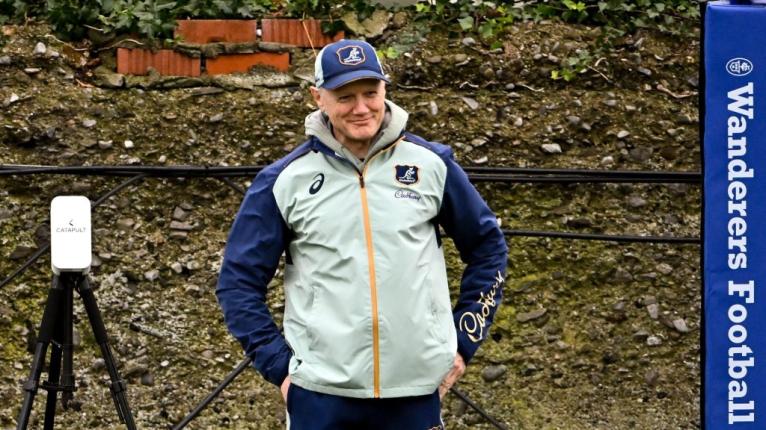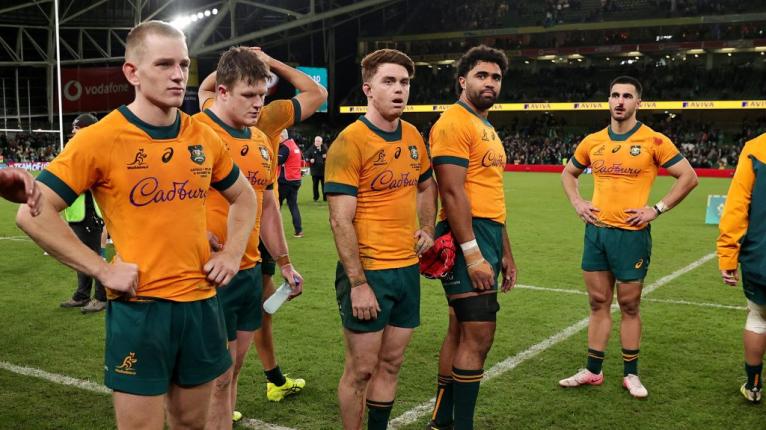It could be the best Christmas gift Australian rugby ever receives. After the Wallabies came achingly close to toppling world number two Ireland in Dublin, there was one question quivering on every true Wallaby supporter’s lips. Can Rugby Australia persuade Joe Schmidt to stay on for another two years, up until the 2027 Rugby World Cup?
The Wallaby supremo has said he will make up his mind at the end of this month. At present, Schmidt’s contract only takes him as far the British and Irish Lions tour visit in July 2025. Santa is still sitting firmly in his chair at the North Pole, and the reindeer are pawing the frozen ground in anticipation.

There is no doubt the ex-Leinster and Ireland coach is well on the way to achieving what appeared well-nigh impossible after a disastrous 2023 World Cup campaign. He has restored the faith of the green and gold support base and his team has demanded the utmost respect of all the opponents he has faced.
Australian rugby is no longer a laughing stock and the Wallabies can justifiably claim to have rejoined a four-strong second tier of the international game which includes England, Scotland and Argentina. South Africa, France, New Zealand and Ireland remain a level above but it is a fine beginning indeed. The jovial man with the big white beard is looking curiously down the Aussie chimney again, even if he has yet to deposit any goods under the tree.
Ex-Wallaby great turned pundit Tim Horan tapped into the positive vibe on Stan Sport:
“We should be so proud of this Wallabies team, and what?they’ve?done in the last four weeks – especially in the first two weeks, winning against England, a win against Wales, they’ve?reengaged a lot of people to fall back in love with rugby.”
For that feeling to snowball, to the point where it rolls downhill of its own volition, Schmidt will need to fix some issues in the so-called ‘periodisation’ of the game.
At the Rugby Championship Australia scored 59% of their points in the first half and conceded the most points of any of the four sides in the final quarter [11.67]. On their end-of-year tour, Australia began to suffer when they encountered teams who kept possession of the ball more efficiently in the second half of games. Ireland and Scotland outscored the Wallabies by a total of 37 points to 16 and slowly squeezed the life out of a team who had led the Rugby Championship in the number of rucks built per game [93].

The issue was thrown into sharpest relief by events in Dublin. Schmidt himself acknowledged as much in his comments after the game.
“We did get to the ball, and we did keep the ball [in the first half], and I felt Max Jorgensen’s try was really well worked to finish that after going side to side.
“In the second half, I felt we got quite conservative. When you do that against Ireland, and you’re hanging on and you’ve got a four-point lead, and you’re hoping that’s enough, I just think we tried to do that from too far out.
“We had a lot less ball in Ireland [in the second period]. You can’t beat them with a sledgehammer. You have got to get the scalpel out, and you’ve got to be accurate. That’s probably a disappointment, as I felt we probably opened them up just enough times to get [some] scoreboard separation.”
Ireland are no longer the attacking force they were on the runway to the 2023 World Cup, but the collective muscle memory of their core group still knows how to hold on to the ball from breakdown to breakdown, and build an attacking rhythm – even when the cutting edge is absent.
An analysis of the game by period, and in terms of the number rucks [breakdowns [BD]] built and the pressure accrued from it by penalty [pen] and turnover [TO], is revealing. Here are the stats from the first half.

Australia were clearly on top in the first quarter and it was by far their best period of the game: they had built 13 more rucks than Ireland, won three more penalties or turnovers at the breakdown, and were 10-0 up on the scoreboard.
The balance began to tilt in the second quarter, with Ireland clawing some of the lost ground in all categories and winning the second 20 minutes 5-3. Now look at the stats from the second half.

All pretence of balance was lost in the second period, with Ireland building more than twice as many rucks and dominating possession of the ball. Even though Farrell’s men only generated four clean breaks off their mountain of possession [compared to the Wallabies’ three], it was still enough to create some ‘scoreboard separation’, with Ireland scoring 17 points to the Wallabies’ six in the last 40.
Even though Ireland’s attack was more blunt-force than razor-sharp, they still racked up 58% of possession and 69% of territory and spent three times longer in the opposition red zone, scoring three tries from close range. They pounded the rock and wore Australia down.
One of the more remarkable hidden stats in the table is that Australia came so close to even-steven in the figures for penalties and turnovers won, in and around the breakdown. Typically, the team which builds the most rucks tends to win the most penalties, often in a ratio as big as two or three to one.
This was not case in Dublin, and that was largely due to the efforts of one man, Wallaby open-side flanker Fraser McReight. The Queenslander made five more tackles than anyone else on the field with no misses, and he added five turnovers in contact just for good measure. It was a prodigious performance, and it underlined the folly of his non-selection for the game against Scotland, arguably in the match where his presence was most needed.
His coach ruefully tipped his hat to the young seven after the game.
“I?thought Fraser got through a mountain of work. He slipped through tackles,?he?got on the ball for turnovers, one clean penalty, and it was very close to getting a few others.
“Fraser was really impressive.?He’s?a quiet achiever: says very little, and?does lots. Fraser is my favourite sort of player: if they talk about it, [they] just get it done.”
One of the great positives in McReight’s performance was the evenness of its distribution across the game. He had three turnovers or turnover assists in the first half, and the next two arrived between the 60th and 70th minutes. Two of the first three turnovers were achieved in combination with other defenders, but the last two were singletons won in isolation.
Both sides struggled to defend this form of attack: a flat midfield hit off a pull-back back from the first forward pod. In both the first two instances it is Australia’s willingness to add a second man in over the tackle ball while under threat that makes the difference: Bobby Valetini in the first, Tom Wright in the second. ‘Lord’ Laurie Fisher always prefers to create problems for the attack at source, if he is able.
The final clip illustrates the ex-Junior Wallabies skipper’s ability to withstand some very hard cleanouts indeed as a single jackal, and that was a theme repeated in the final quarter.
McReight has erased one of the old weaknesses from his breakdown work, and is now very picky about which rucks to contest. The one penalty debited against his name in the official match stats came as the result of another defender failing to roll away from the tackle, rather than any error on the Australian’s part. Add that good decision-making to an engine which runs and runs, and you have some player on D.
On the other side of the ball, the skill which sets McReight so far apart from his main rival for the spot [the Force’s Carlo Tizzano] is his intelligence around the ball and the carrying power once he has made the ‘save’.
Both these situations demand the urgent clean-up attention of a top seven, and benefit from his ability to glue the play together: in the first example the attacking side is never more vulnerable than when it has made a long break and the ball-carrier has out-distanced his support; in the second McReight rescues a potentially losing ruck after Joe McCarthy busts the protective pocket around the ball.
Schmidt may have finished his first season as Wallaby head coach with six wins out of 13, but he has restored the pride in the green and gold jersey after a World Cup fiasco. He enthuses his charges and he demands the respect of every opponent he encounters.
It is now up to RA to ensure they persuade him to extend his contract for the full four-year cycle, all the way up to the home World Cup in 2027. There could be no finer Christmas gift for Australian rugby. And if you see the Santa delivering it, still going strong well into the night, scurrying up and down chimneys in his red-and-white headgear, do not be surprised if it looks suspiciously like Fraser McReight.


Comments
Join free and tell us what you really think!
Sign up for free